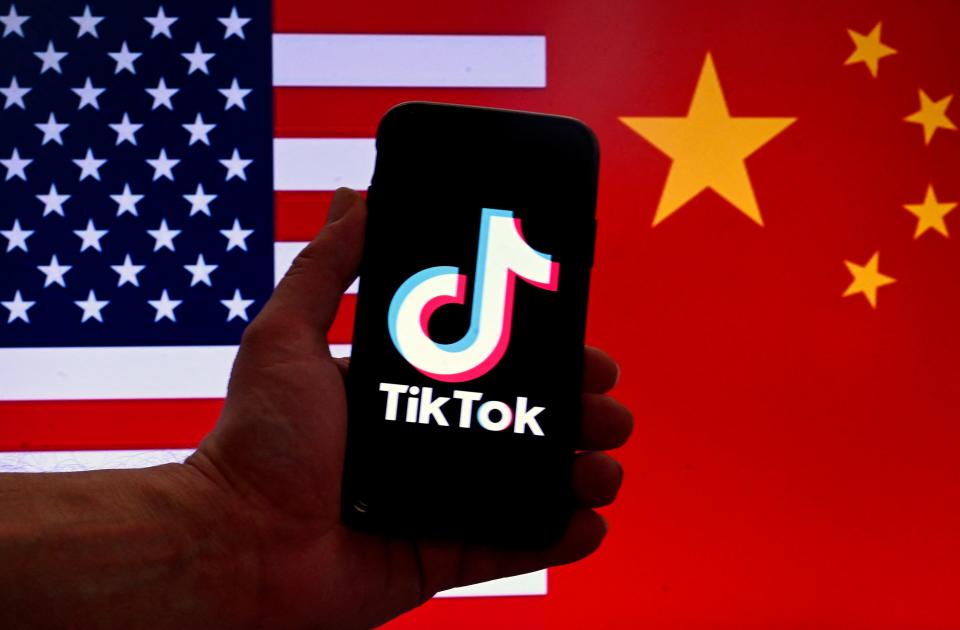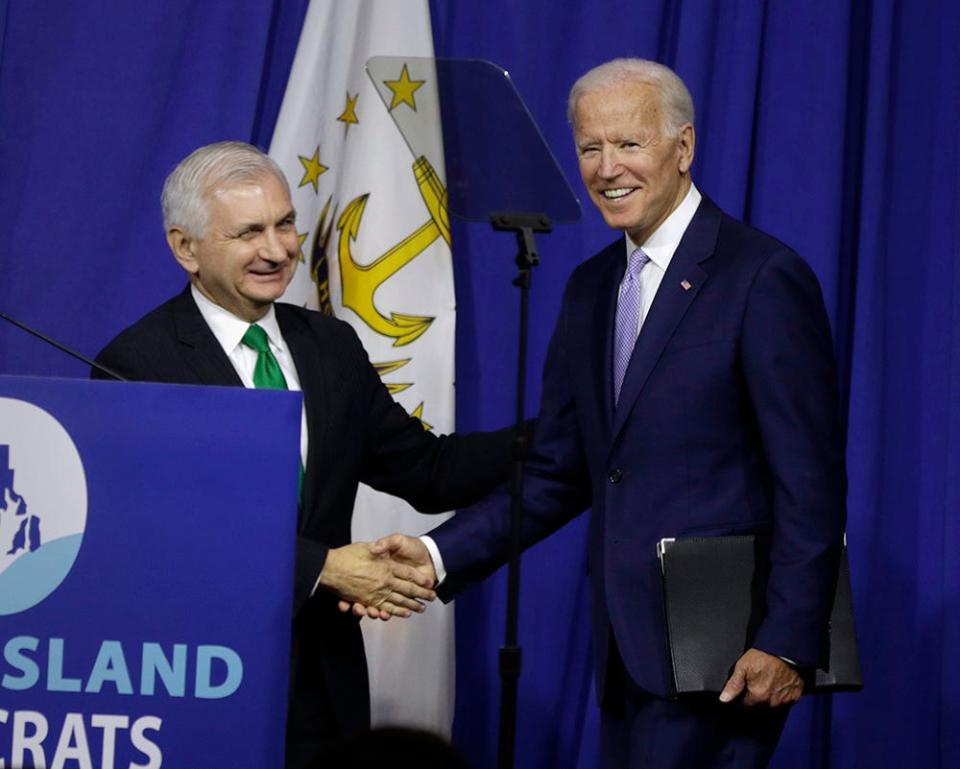Does Rhode Island's congressional delegation support banning, or selling, TikTok?
- Oops!Something went wrong.Please try again later.
- Oops!Something went wrong.Please try again later.
Members of Congress have been talking a lot about the gay dating app Grindr more than usual these days.
That's because they see its 2020 forced sale from a Chinese company to a United States company as a model for the future of a much larger company, TikTok.
Earlier this month, the U.S. House of Representatives overwhelmingly passed a bipartisan bill that would force ByteDance, the Chinese company that owns TikTok, to sell the video-based social media site to an owner based outside the People's Republic of China.
Both of Rhode Island's House members – Representatives Seth Magaziner and Gabe Amo – voted with the majority in favor of forcing a sale.

Why are lawmakers pushing for the sale of TikTok
Lawmakers are concerned about TikTok because of its size – 170 million U.S. users – the fact that many young Americans are getting information from the site, and the Chinese government's aggressive propaganda strategy. The bill's title is the Protecting Americans from Foreign Adversary Controlled Applications Act.
Despite the lopsided vote and bipartisan support for the bill, which President Joe Biden said he would sign, it is not a sure thing that he will get a chance.
Will Rhode Island's senators vote for the bill?
The Senate, which needs to be able to clear a filibuster, is moving slowly on the bill, with some top Senate Democrats expressing concerns about whether it would pass constitutional muster.
Neither of Rhode Island's U.S. senators has come out for or against the House TikTok bill should it make it to the Senate floor.

Sen. Sheldon Whitehouse "is taking a close look at the legislation."
Sen. Jack Reed seems a little more enthusiastic, and spokesman Chip Unruh said Reed "has national security concerns about the current ownership of TikTok, its connection to the Chinese government, and how it could use data and its curation algorithm against American citizens and interests."
However, Reed has some concerns about what happens if TikTok is forced to find a new owner.
"He believes whoever ultimately owns TikTok should be required to provide ongoing transparency of its ownership, financial obligations, and activities," Unruh wrote. "This is a feature the House bill lacks."

What would the bill forcing the sale of TikTok actually do?
The House bill would make it illegal for app stores to sell, or internet service providers to host, any application owned by a "foreign adversary" with more than 1 million active users that "permits a user to create an account or profile to generate, share, and view text, images, videos, real-time communications, or similar content."
"This is not a TikTok ban," Amo said in a phone interview Wednesday. "I did not vote on a TikTok ban. I voted on a divestiture. And this is essentially not having the People's Republic of China control a really important platform for communication."
In the runup to the House vote on the TikTok bill, Amo said children as young as 8 had contacted his office urging him to vote no, a sign that the company was ramping up a pressure campaign.
Can the US actually force the sale of TikTok?
Of course, even if the bill becomes law, forcing a sale of TikTok may end up being more complicated than it seems.
The app's popularity and reach speak to its value, and the list of companies with both the means to buy it and skills to run it may be limited.
"I'm certainly not going to be one of the bidders, so it's hard for me to project, but there's a market out there," Amo said. "Grindr, the LGBTQ dating app, was sold by its Chinese owners because of the response from the Committee on Foreign Investment in the United States. And so there is precedent for a sale."
Chinese gaming company Beijing Kunlun Tech sold Grindr for more than $600 million in 2020 to an entity called San Vicente Acquisition LLC. According to Reuters, San Vicente was formed days before the sale and its investors have ties to Kunlun.
Others have worried that many American tech giants do business in China, which could expose them to pressure from Beijing and also fuel concerns about consolidation of the industry.
Grindr had around 27 million users when it was sold, a fraction of TikTok's user base.
Antitrust implications of acquisition by a US social media company
Would adding TikTok to Meta's social media assets be good for the industry?
What about Elon Musk, owner of X, the microblogging site formerly known as Twitter?
Magaziner said the fact that TikTok is so much larger and more valuable than Grindr makes it more likely that a sale preventing its ban would happen, not less.
"Because ByteDance would be walking away from tens of billions, and perhaps hundreds of billions of dollars, if they did not sell," he said.
More: Tiktok has become an important marketing tool for Newport businesses. Would a ban hurt?
"Of course, I'm concerned about the antitrust implications if another large social media company, someone like an Elon Musk or Facebook, were to try to purchase TikTok," he said. "And I think that at the Federal Trade Commission now with [chairwoman] Lina Khan commissioner, who is very familiar with antitrust issues in the tech space, would probably move to prevent that from happening."
The Trump factor
Considering possible legal challenges, a TikTok divestiture might not go through until after the November election, meaning there is a decent chance that GOP nominee Donald Trump would be in charge of enforcing a sale.
Trump tried to force a sale of TikTok toward the end of his first term as president using executive authority, but the move was struck down by the courts.
More recently, Trump has come out against forcing ByteDance to give up TikTok.
And he owns his own social media platform. Could Truth Social buy TikTok?
"I don't think Truth Social can afford it," Magaziner said, adding that he thinks the country would benefit from a look at broader legislation around data privacy and children using social media platforms. "We were given an up-or-down vote on TikTok specifically and on whether to force a sale, and in that up-or-down vote I felt, along with the vast majority of my colleagues, that it is the right thing to do."
Before he left Congress to lead the Rhode Island Foundation, David Cicilline had become one of the more active lawmakers on social media and antitrust. Cicilline declined through the foundation to opine on the TikTok ban.
Possible legal challenges facing a TikTok ban
On top of all the practical and political challenges facing TikTok, there are legal questions.
The ACLU has come out against the House TikTok bill on free speech grounds.
Peter Margulies, a professor at the Roger Williams University law school, said there are questions about the TikTok bill on First Amendment grounds and that singling out one company might violate the equal protection clause of the 14th Amendment plus rules against "bills of attainder," legislation to punish a specific person without a judicial trial.
The legal argument for the bill would be that it "doesn't directly regulate the content of any provider, just ownership, and Congress has a right to do that," Margulies said. "And on the the equal protection issue that this is just a form of regulation."
"There are serious arguments on both sides," he added. "I tend to be more sympathetic to the arguments against the constitutionality of this matter."
There are no bills pending in the General Assembly related to TikTok.
Sen. Tiara Mack, a Providence Democrat, is the only state lawmaker who actively uses TikTok to reach voters (as far as Political Scene is aware.) Last year she said she hadn't looked into the specifics of a potential ban to have a stance on it.
This article originally appeared on The Providence Journal: Would Rhode Island's congressional delegation support a TikTok ban, or sale?

